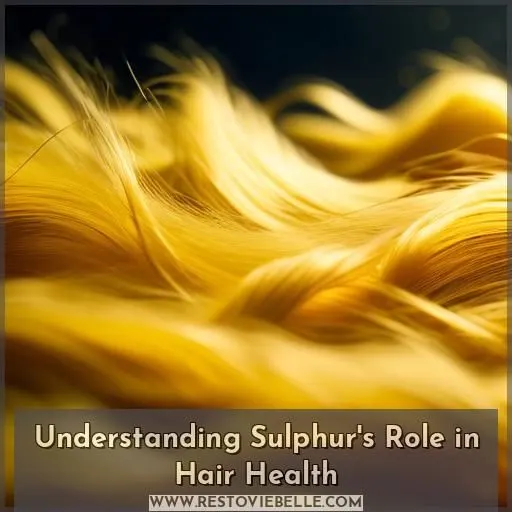This site is supported by our readers. We may earn a commission, at no cost to you, if you purchase through links.
 Yes, sulphur is excellent for your hair’s health.
Yes, sulphur is excellent for your hair’s health.
It forms the building blocks of keratin, giving your hair that coveted strength and elasticity. Sulphur aids cellular detoxification and keratin production, helping extend your hair’s growth phase. It bolsters follicle health, minimizing excessive shedding and thinning.
Identify sulphur deficiency through brittle strands, split ends, and scalp irritation. Incorporating sulphur-rich foods like eggs, Brussels sprouts, and garlic into your diet provides a natural boost.
Discover the secret to luscious locks by exploring sulphur’s multifaceted benefits.
Table Of Contents
Key Takeaways
- Sulfur is a critical component of the protein keratin, which provides hair with strength and elasticity.
- Sulfur plays a role in extending the anagen phase, the growth phase of hair, and minimizing hair thinning.
- Sulfur deficiency can lead to brittle hair, fragile nails, and dry skin.
- Incorporating sulfur-rich foods into your diet, such as fish, beef, poultry, eggs, Brussels sprouts, asparagus, onions, garlic, broccoli, cauliflower, kale, wheat germ, and MSM supplements, can help replenish sulfur levels and promote healthy hair growth.
Is Sulphur Good for Hair?
Yes, sulfur is beneficial for hair. Sulfur is an indispensable component of keratin, the protein responsible for hair’s structural integrity. It also participates in the production of keratin and collagen, which are essential for maintaining the flexibility and strength of hair follicles.
Sulfur may contribute to a healthy scalp, which is vital for optimizing overall hair health. It possesses antibacterial properties that shield the scalp from infections, preserving scalp health and fostering hair growth. Sulfur may also extend the anagen or growth phase of the hair cycle, ensuring vigorous hair growth.
Moreover, sulfur reinforces the hair cuticle, enhancing its resilience and protecting the inner layer of each hair strand. Sulfur-based products may promote thicker, more lustrous, and more robust hair when used judiciously and in appropriate quantities.
Understanding Sulphur’s Role in Hair Health
Hair is primarily composed of keratin, a protein rich in sulfur. Sulfur plays a critical role in maintaining the structural integrity of hair by forming disulfide bonds that give hair its strength and elasticity. You can’t have healthy, luscious locks without sufficient sulfur.
Keratin and Hair Structure
Keratin, a protein rich in sulphur, forms the building blocks of your hair. It’s a critical component of your hair’s structure, providing strength and elasticity. By understanding the composition and structure of keratin, you can appreciate sulphur’s role in maintaining healthy hair. Here’s what you need to know:
- Keratin Composition: Keratin is primarily composed of amino acids, including sulphur-rich cysteine, which forms disulfide bonds. These bonds give keratin its unique structure and strength.
- Keratin Structure: Hair is made up of a cortex, medulla, and cuticle. The cortex contains the most keratin, providing hair’s strength and elasticity. The cuticle, the outermost layer, protects the hair from damage.
- Sulphur’s Role: Sulphur is essential for the formation of disulfide bonds in keratin, which contribute to the overall structure of your hair. Without sulphur, your hair would lack strength and elasticity, leading to brittle and weak strands.
Sulphur’s Cellular Functions
Sulphur is a vital mineral for healthy cells and plays a key role in hair health.
Grasping sulphur’s cellular functions is imperative for maintaining lustrous, healthy hair.
Sulphur participates in sulfur metabolism, which is essential for cellular detoxification and keratin production. It strengthens hair by enhancing its elasticity and flexibility, making it more resistant to damage.
A sulfur deficiency can result in fragile hair and dry skin, as well as hair thinning.
To promote optimal hair growth and health, it’s vital to maintain a balanced sulfur intake through diet and topical applications.
Signs of Sulphur Deficiency in Hair
If your hair feels dry, brittle, and easily breaks or sheds, it could be a sign of sulphur deficiency. Other indicators include weak, peeling nails and dry, cracked skin, as sulphur plays an important role in maintaining the integrity and strength of keratin-based structures like hair and nails.
Identifying Brittle and Weak Hair
Sulphur is a critical component for healthy hair, and its deficiency can lead to brittle, weak, and damaged strands.
Look for signs like split ends, hair loss, scalp irritation, and dandruff. Hair breakage is another indicator of sulphur deficiency.
Sulfur-rich diets, including fish, beef, poultry, eggs, and plant-based foods like Brussels sprouts, asparagus, and broccoli, can help replenish sulphur levels.
Topical sulphur treatments, such as sulphur-infused hair care products, can also strengthen hair and improve elasticity.
However, be cautious with sulphur mustard, a chemical warfare agent, as it can cause severe damage to the hair and scalp.
Nail and Skin Indicators
As we explore deeper into the significance of sulfur for hair health, it’s vital to recognize the symptoms of sulfur deficiency that can impact your hair, nails, and skin. These symptoms can suggest a possible issue with your sulfur intake and may require attention to maintain healthy hair growth and overall wellness.
- Brittle hair: A deficiency in sulfur can lead to weak and brittle hair, as sulfur is a key component of the protein keratin, which provides hair its strength and elasticity.
- Fragile nails: Sulfur is also essential for the formation of keratin in nails, so a deficiency can result in weak and brittle nails.
- Dry skin: Sulfur helps maintain skin elasticity, and a deficiency can cause dry, flaky skin.
- Hair loss and thinning: Sulfur plays a role in the growth phase of hair, and a deficiency can extend the resting phase, leading to hair loss and thinning.
To address these issues, it’s important to make sure you’re consuming sufficient sulfur-rich foods in your diet. Some of the best sources include fish, beef, poultry, eggs, brussel sprouts, asparagus, onions, garlic, broccoli, cauliflowers, kale, wheat germ, and even some plant-based foods like legumes.
If you suspect a sulfur deficiency or are experiencing the symptoms mentioned above, consider consulting a healthcare professional for guidance on dietary changes or supplementation. Remember, maintaining a balanced diet and adequate intake of essential minerals like sulfur is essential for overall health and well-being.
Sulphur’s Impact on Hair Growth Cycles
Sulphur is vital for supporting healthy hair growth cycles. It aids in extending the anagen (growth) phase, resulting in longer, fuller hair strands while diminishing excessive shedding or thinning caused by premature transition into the telogen (resting) phase.
Extending the Anagen Phase
Imagine your hair as a garden. Sulphur is the exceptional fertilizer** guaranteeing vigorous growth.
By augmenting your sulphur intake, you’re fundamentally extending your hair’s growth duration, especially the anagen phase—when your locks are actively sprouting. This extension is akin to granting your hair a longer season to thrive, bolstering follicle health and ameliorating hair texture.
Without adequate sulphur, hair becomes as parched and fragile as autumn leaves. Sulphur serves as a bulwark against the relentless vapour exposure of daily life, preserving the vitality of your hair.
So, is sulphur beneficial for hair? Unequivocally!
Reducing Hair Thinning
Sulfur is a crucial mineral for healthy hair growth, and its deficiency can lead to brittle hair, fragile nails, and dry skin. Sulfur is essential for keratin synthesis, which is the protein that constitutes hair. It provides hair with strength and flexibility, and its absence can result in weak and brittle hair. Sulfur also plays a role in prolonging the anagen phase, which is the growth phase of hair, and minimizing hair thinning.
To make sure you’re consuming sufficient sulfur, incorporate sulfur-rich foods into your diet, such as fish, beef, poultry, eggs, brussel sprouts, asparagus, onions, garlic, broccoli, cauliflowers, kale, wheat germ, and MSM supplements. These foods provide the raw materials for keratin synthesis and help to strengthen and nourish hair.
If hair loss is a concern for you, consider seeking advice from a hair loss expert at the Belgravia Centre, which offers complimentary consultations and online consultations for home-use treatments. They can provide tailored advice and treatment plans to help you achieve healthy, natural hair growth.
Dietary Sources of Sulphur
You can obtain sulphur from both animal-based and plant-based sources in your diet. Some sulphur-rich animal foods include fish, beef, poultry, and eggs, while plant sources encompass vegetables like Brussels sprouts, asparagus, onions, garlic, broccoli, cauliflower, kale, and wheat germ.
Animal-Based Sulphur-Rich Foods
Animal-based sources are an essential part of our diet for sulfur intake. Sulfur is fundamental for maintaining healthy cells, particularly crucial for hair growth and strength. Here are some animal-based foods that are high in sulfur:
| Food | Sulfur Content (mg) |
|---|---|
| Turkey breast | 710 |
| Brazil nuts | 1495 |
| Canned tuna | 1259 |
| Swiss Cheese | 456 |
| Eggs | 224 |
These foods provide a substantial amount of sulfur, necessary for producing cysteine, an amino acid essential for protein synthesis. Consuming a balanced diet that includes a variety of these sulfur-rich animal-based foods can help guarantee you’re receiving sufficient sulfur for healthy hair growth and overall well-being.
Plant-Based Sulphur-Rich Foods
Plant-based sulfur-rich foods are a prime source of this essential mineral for hair growth stimulation, hair loss prevention, and dandruff treatment. Adding these foods to your diet can notably enhance scalp health. Here are the top three plant-based foods to contemplate:
- Allium vegetables: Garlic, leeks, onions, scallions, and shallots are rich in sulfur and offer numerous health benefits. They’re known for their anti-inflammatory properties and can help reduce the risk of cardiovascular disease.
- Cruciferous vegetables: Arugula, broccoli, Brussels sprouts, cabbage, cauliflower, kale, and radishes are high in glucosinolates, a sulfur-containing compound that may contribute to lower incidences of cardiovascular disease.
- Legumes: Chickpeas, faba beans (broad beans), kidney beans, lentils, and peas are excellent sources of sulfur-rich amino acids, cysteine and methionine.
Incorporating these foods into your diet can help make sure you’re getting enough sulfur for healthy hair growth and overall well-being.
Topical Applications of Sulphur for Hair
While incorporating sulphur-rich foods into your diet is beneficial, you can also leverage sulphur’s hair-nourishing prowess through topical applications.
Homemade hair masks or conditioners infused with sulphur-containing ingredients like onion juice, garlic, or even medical-grade sulphur powder can strengthen strands and alleviate scalp issues.
Alternatively, explore commercial hair care products formulated with sulphur or its derivatives, such as selenium sulfide or MSM (methylsulfonylmethane), to reap the mineral’s fortifying and antibacterial advantages.
Sulfur-Infused Hair Care Recipes
Immerse yourself in the realm of homemade hair care with sulfur-enriched formulas!
Experiment with a sulfur hair mask, a simple blend of sulfur powder and water, applied to damp hair after cleansing.
Alternatively, try a sulfur hair rinse by adding sulfur powder to your conditioner prior to rinsing.
For a deep treatment, create a sulfur shampoo by combining sulfur powder with your shampoo base.
Don’t overlook sulfur hair oil, which can be applied to damp hair before styling.
These do-it-yourself options offer an excellent way to incorporate sulfur into your hair care regimen, providing strength and flexibility to your tresses.
Commercial Sulfur Hair Care Options
If you seek to integrate sulfur into your hair care regimen, there are numerous commercial products available that provide the advantages of sulfur for hair. Here are four options to explore:
- Color Wow Kale-Infused Dream Cocktail: This product is infused with sulfur and kale to fortify and hydrate hair. Apply it to damp hair after shampooing and leave it on for a few minutes before rinsing.
- Color Wow + Chris Appleton Money Masque Deep Hydrating Hair Treatment: This deep conditioning treatment contains sulfur and other nourishing ingredients to enhance hair elasticity and reduce breakage. Apply it to dry hair, cover with a plastic cap, and leave it on for 20 minutes before rinsing.
- Selenium Sulfide Shampoo: Selenium sulfide is a common ingredient in anti-dandruff shampoos that can also provide sulfur benefits. Use it as directed to combat dandruff and promote a healthy scalp.
- Homemade Sulfur Hair Mask: If you prefer a DIY approach, you can create a sulfur hair mask using ingredients like egg whites, apple cider vinegar, and sulfur powder. Mix these ingredients together, apply the mixture to your hair, and leave it on for 15-20 minutes before rinsing.
Remember to always conduct a patch test for new products and modify application methods based on your hair type and personal preferences.
Potential Downsides of Sulphur Use
While sulphur is generally well-tolerated, some individuals may experience allergic reactions or sensitivities, especially with topical application. It’s essential to introduce sulphur-based hair products gradually and monitor for any adverse effects, as excessive use can potentially lead to scalp irritation, dryness, or worsening of existing conditions.
Allergic Reactions and Sensitivities
When adding sulfur to your hair care routine, it’s vital to be aware of possible allergic reactions or sensitivities. Sulfur can trigger skin irritation, redness, or other adverse effects in some individuals. Before using sulfur-containing products, it’s important to do a patch test to make sure you’re not sensitive to the ingredient. Apply a small amount of the product to a hidden area, such as the inside of your arm, and wait 24 hours. If no side effects occur, you can then proceed to use the product on your hair. However, if you develop redness, a rash, or hives, stop using the product.
When using sulfur for acne treatment, it’s also important to note that sulfur has a distinctive and sometimes unpleasant odor. Some people may find this to be an aesthetic issue, as the odor could persist in their hair. Additionally, excessive dryness and irritation are possible when first using sulfur for acne treatment. Gradually increase the application to two or three times per day once your skin adjusts to the product.
Balancing Sulphur Application
To achieve a balanced sulfur application for optimal hair health, it’s important to assess the regularity and duration of use, as well as the type of product employed. Sulfur-infused products can be utilized as leave-in or rinse-out conditioners, based on individual hair sensitivities and preferences. For individuals with dry hair, a leave-in conditioner might be more advantageous, while those with oily hair may favor a rinse-out conditioner.
When incorporating sulfur-infused hair care products into your routine, it’s imperative to adhere to the manufacturer’s instructions regarding application and frequency. In certain instances, applying the product once or twice weekly may suffice, while others may require daily use. It’s also prudent to consider combining sulfur treatments with other hair care practices, such as shampooing, to prevent excessive sulfur buildup.
Individual hair sensitivities can also influence the appropriate balance of sulfur application. Some individuals may experience allergic reactions or irritation when utilizing sulfur products, so it’s essential to conduct a patch test prior to applying the product to the scalp. If irritation arises, it may be necessary to reduce the frequency of application or opt for a different sulfur-containing product.
Frequently Asked Questions (FAQs)
What is the recommended dosage of sulfur for hair growth?
Ironic as it may seem, there’s no single dosage for sulfur and hair growth. Scientifically speaking, the key is consistency – using sulfur-rich products regularly can help strengthen hair over time. But don’t go overboard; moderation is key for luscious locks.
Can sulfur be used for hair loss prevention?
Yes, sulfur can help prevent hair loss. It extends the hair growth phase, reducing shedding and thinning. You’ll get stronger, more elastic strands by boosting your body’s sulfur levels through diet or topical products. It’s a must-try for luscious locks!
What are the potential side effects of using sulfur-based hair products?
Well, aren’t you a daring one, considering sulfur for your luscious locks! Most mild side effects like dryness or irritation can be managed. But if Rapunzel’s tower starts smelling of rotten eggs, you might want to reconsider your hair potion recipe!
How does sulfur affect hair porosity?
Sulfur helps regulate moisture levels, reducing porosity. It strengthens hair’s protective cuticle layer, preventing excessive water absorption that leads to frizz and damage. With lower porosity, your locks stay sleek and manageable.
Can sulfur be used in combination with other hair growth stimulants?
Sulfur synergizes with other growth-boosting nutrients like biotin and zinc, amplifying their hair-reviving powers. Combine sulfur-rich treatments with a balanced diet for a one-two punch against thinning locks.
Conclusion
Well, the proof is in the pudding – sulfur is indeed the secret mineral for luscious, healthy hair. Incorporating sulfur-rich foods and topical applications into your routine can work wonders for strengthening hair, stimulating growth, and maintaining a healthy scalp.
Whether you’re dealing with brittle strands or excessive shedding, the evidence shows that sulfur is your hair’s best friend.
So don’t miss out on this powerful, yet often overlooked, nutrient for achieving the lustrous locks you’ve always dreamed of.












